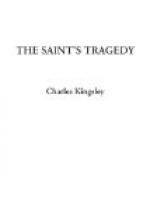P. 100. ‘White whales’ bone’ (i.e. the tooth of the narwhal); a common simile in the older poets.
P. 104. ‘The nuns of Kitzingen.’ Cf. Lib. V. section 1. ’After this, the noble Lady the Abbess of Kitzingen, Elizabeth’s aunt according to the flesh, brought her away honourably to Eckembert, Lord Bishop of Bamberg.’
P. 106. ‘Aged crone.’ Cf. Lib. IV. section 8, where this whole story is related word for word.
P. 109. ‘I’d mar this face.’ Cf. Lib. V. section 1. ’If I could not,’ said she, ’escape by any other means, I would with my own hands cut off my nose, that so every man might loathe me when so foully disfigured.’
P. 110. ‘Botenstain.’ Cf. ibid. ’The bishop commanded that she should be taken to Botenstain with her maids, until he should give her away in marriage.’
P. 111. ‘Bear children.’ Ibid. ’The venerable man, knowing that the Apostle says, “I will that the younger widows marry and bear children,” thought of giving her in marriage to some one—an intention which she perceived, and protested on the strength of her “votum continentiae."’
P. 113. ‘The tented field.’ All records of the worthy Bishop on which I have fallen, describe him as ‘virum militia strenuissimum,’ a mighty man of war. We read of him, in Stero of Altaich’s Chronicle, A.D. 1232, making war on the Duke of Carinthia destroying many of his castles and laying waste a great part of his land; and next year, being seized by some bailiff of the Duke’s, and keeping that Lent in durance vile. In a A.D. 1237 he was left by the Emperor as ‘vir magnaminus et bellicosus,’ in charge of Austria, during the troubles with Duke Frederick; and died in 1240.
P 115. ‘Lewis’s bones.’ Cf. Lib. V. section 3.
P 118. ‘I thank thee.’ Cf. Lib. V. section 4. ’What agony and love there was then in her heart, He alone can tell who knows the hearts of all the sons of men. I believe that her grief was renewed, and all her bones trembled, when she saw the bones of her beloved separated one from another (the corpse had been dug up at Otranto, and boiled.) But though absorbed in so great a woe, at last she remembered God, and recovering her spirit said—(Her words I have paraphrased as closely as possible.)
Ibid. ‘The close hard by.’ Cf. Lib. V section 4.
NOTES TO ACT IV
P 120. ‘Your self imposed vows.’ Cf. Lib. IV. section I. ’On Good Friday, when the altars were exhibited bare in remembrance of the Saviour who hung bare on the cross for us, she went into a certain chapel, and in the presence of Master Conrad, and certain Franciscan brothers, laying her holy hands on the bare altar, renounced her own will, her parents, children, relations, “et omnibus hujus modi pompis,” all pomps of this kind (a misprint, one hopes, for mundi) in imitation of Christ, and “omnmo se exuit et nudavit,” stripped herself utterly naked, to follow Him naked, in the steps of poverty.’




